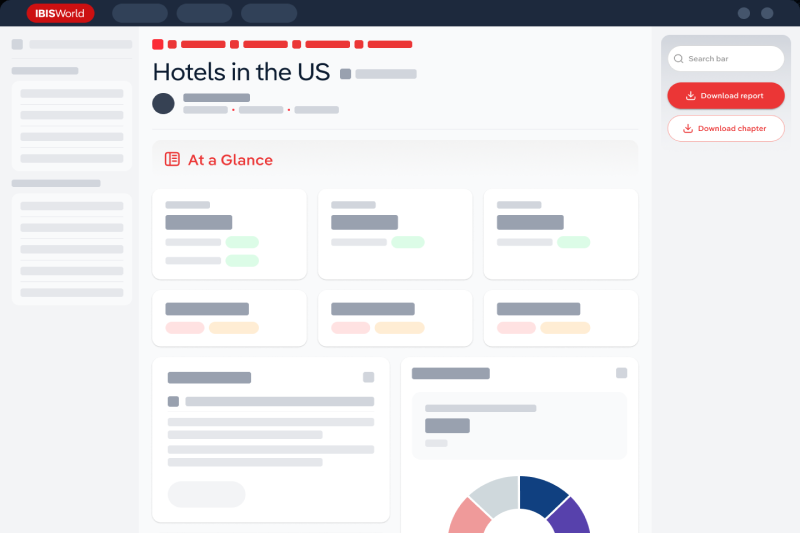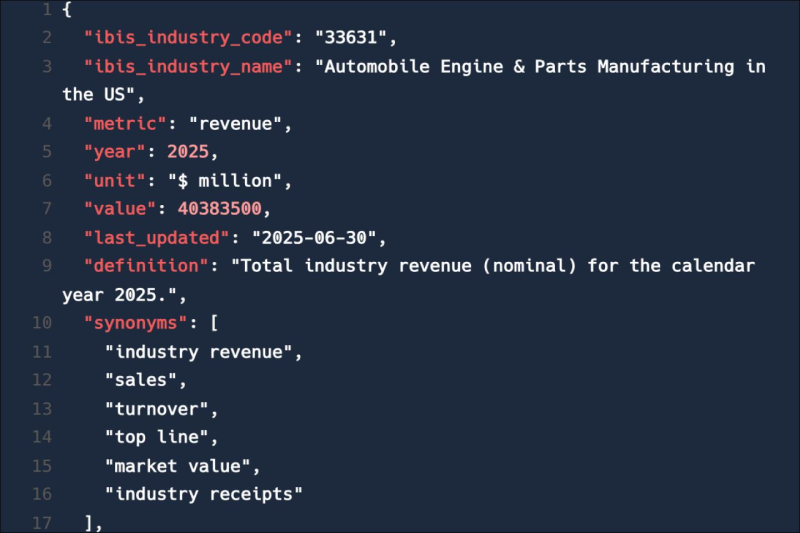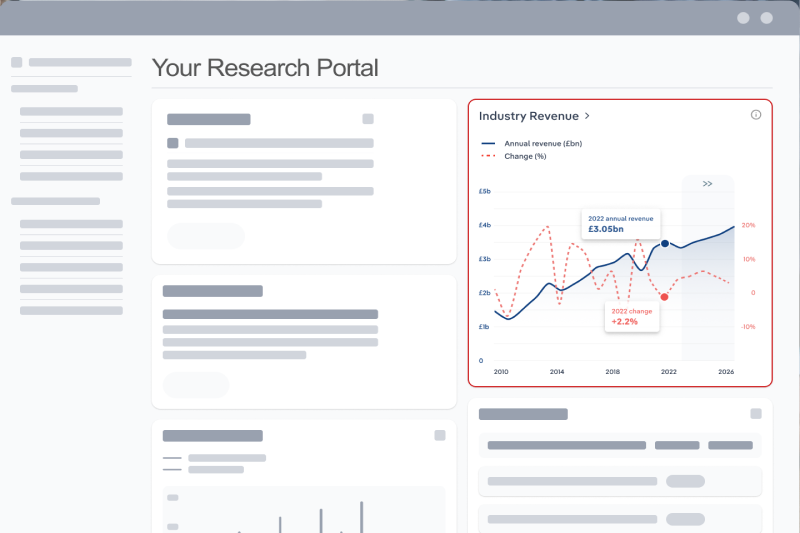IBISWorld Platform
Answer any industry question in minutes with our entire database at your fingertips.

The Freight Rail Transport industry is expected to generate $76.3 billion in 2024, up by 3.2% from 2023. Over the five years to 2024, industry revenue is expected to increase at a CAGR of 9.7%. In 2024, approximately 19 establishments operate in the industry, employing about 255,220 workers and paying total wages of $9.9 billion. In 2023, the freight transportation turnover by railway increased by 1.4%, to 3.6 trillion ton-kilometers, representing 14.7% of the total freight transportation turnover in China . Profit is expected to account for 7.5% of industry revenue in 2024. The Chinese Government has invested heavily to expand the railway network. The Government spent over $100 billion annually on railway construction in the past decade to 2023. By the end of 2023, the length of China's railways in operation had reached 159,000 kilometers, among which the length of high-speed railways in operation has reached 45,000 kilometers, China's railway transportation capacity increased greatly.In 2013, the railway freight transportation turnover only accounted for less than 2% of total social freight transportation turnover in China, and the proportion increased to 14.7% in 2023. With stable development of economy, railway transportation will give full play to its advantages in reducing social logistics costs. With the further market-oriented reform of railway freight transportation, railway transportation will make greater contribution to reducing social logistics costs.Over the next five years to 2029, the Chinese Government will open the railway construction industry to more private and foreign investment. The only industry operator, China Railway, will also implement reforms to rail transport pricing. These reforms could significantly affect the industry, as freight transport pricing is currently market driven. ACMR-IBISWorld forecasts that industry revenue will increase at a CAGR of 4.5% to reach $94.9 billion in 2029.

Answer any industry question in minutes with our entire database at your fingertips.

Feed trusted, human-driven industry intelligence straight into your platform.

Streamline your workflow with IBISWorld’s intelligence built into your toolkit.
IBISWorld's research coverage on the Freight Rail Transport industry in China includes market sizing, forecasting, data and analysis from 2014-2029. The most recent publication was released November 2024.
The Freight Rail Transport industry in China operates under the industry code 5120. The Freight Rail Transport industry in China operates railways for the transportation of freight across China. The industry comprises state-owned railways as well as local railways (invested and operated by local governments) for transferring freight or cargo. The management and operation of railway terminals and station facilities is not included in this industry. Related terms covered in the Freight Rail Transport industry in China include electrified railways, double-track railways and rolling stock.
Products and services covered in Freight Rail Transport industry in China include Medium-distance transportation of freight , Long-distance transportation of freight and Short-distance transportation of freight .
Companies covered in the Freight Rail Transport industry in China include China State Railway Group Co., Ltd.
The Performance chapter covers detailed analysis, datasets, detailed current performance, sources of volatility and an outlook with forecasts for the Freight Rail Transport industry in China.
Questions answered in this chapter include what's driving current industry performance, what influences industry volatility, how do successful businesses overcome volatility, what's driving the industry outlook. This analysis is supported with data and statistics on industry revenues, costs, profits, businesses and employees.
The Products and Markets chapter covers detailed products and service segmentation and analysis of major markets for the for the Freight Rail Transport industry in China.
Questions answered in this chapter include how are the industry's products and services performing, what are innovations in industry products and services, what products or services do successful businesses offer and what's influencing demand from the industry's markets. This includes data and statistics on industry revenues by product and service segmentation and major markets.
The Geographic Breakdown chapter covers detailed analysis and datasets on regional performance of the Freight Rail Transport industry in China.
Questions answered in this chapter include where are industry businesses located and how do businesses use location to their advantage. This includes data and statistics on industry revenues by location.
The Competitive Forces chapter covers the concentration, barriers to entry and supplier and buyer profiles in the Freight Rail Transport industry in China. This includes data and statistics on industry market share concentration, barriers to entry, substitute products and buyer & supplier power.
Questions answered in this chapter include what impacts the industry's market share concentration, how do successful businesses handle concentration, what challenges do potential industry entrants face, how can potential entrants overcome barriers to entry, what are substitutes for industry services, how do successful businesses compete with substitutes and what power do buyers and suppliers have over the industry and how do successful businesses manage buyer & supplier power.
The Companies chapter covers Key Takeaways, Market Share and Companies in the Freight Rail Transport industry in China. This includes data and analysis on companies operating in the industry that hold a market share greater than 5%.
Questions answered in this chapter include what companies have a meaningful market share and how each company is performing.
The External Environment chapter covers Key Takeaways, External Drivers, Regulation & Policy and Assistance in the Freight Rail Transport industry in China. This includes data and statistics on factors impacting industry revenue such as economic indicators, regulation, policy and assistance programs.
Questions answered in this chapter include what demographic and macroeconomic factors impact the industry, what regulations impact the industry, what assistance is available to this industry.
The Financial Benchmarks chapter covers Key Takeaways, Cost Structure, Financial Ratios, Valuation Multiples and Key Ratios in the Freight Rail Transport industry in China. This includes financial data and statistics on industry performance including key cost inputs, profitability, key financial ratios and enterprise value multiples.
Questions answered in this chapter include what trends impact industry costs and how financial ratios have changed overtime.
The Industry Data chapter includes 10 years of historical data with 5 years of forecast data covering statistics like revenue, industry value add, establishments, enterprises, employment and wages in the Freight Rail Transport industry in China.
More than 6,000 businesses use IBISWorld to shape local and global economies
We were able to supplement our reports with IBISWorld’s information from both a qualitative and quantitative standpoint. All of our reporting now features some level of IBISWorld integration.

IBISWorld delivers the crisp business knowledge we need to drive our business. Whether it be serving up our major clients, winning new business or educating on industry issues, IBISWorld brings real value.

IBISWorld has revolutionised business information — which has proved commercially invaluable to exporters, investors and public policy professionals in Australia and overseas.

When you’re able to speak to clients and be knowledgeable about what they do and the state that they operate in, they’re going to trust you a lot more.

The market size of the Freight Rail Transport industry in China is $76.3bn in 2026.
There are 1 businesses in the Freight Rail Transport industry in China, which has declined at a CAGR of 0.0 % between 2019 and 2024.
The Freight Rail Transport industry in China is unlikely to be materially impacted by import tariffs with imports accounting for a low share of industry revenue.
The Freight Rail Transport industry in China is unlikely to be materially impacted by export tariffs with exports accounting for a low share of industry revenue.
The market size of the Freight Rail Transport industry in China has been growing at a CAGR of 9.7 % between 2019 and 2024.
Over the next five years, the Freight Rail Transport industry in China is expected to grow.
The biggest company operating in the Freight Rail Transport industry in China is China State Railway Group Co., Ltd.
Short-distance transportation of freight and Medium-distance transportation of freight are part of the Freight Rail Transport industry in China.
The company holding the most market share in the Freight Rail Transport industry in China is China State Railway Group Co., Ltd..
The level of competition is low and increasing in the Freight Rail Transport industry in China.




